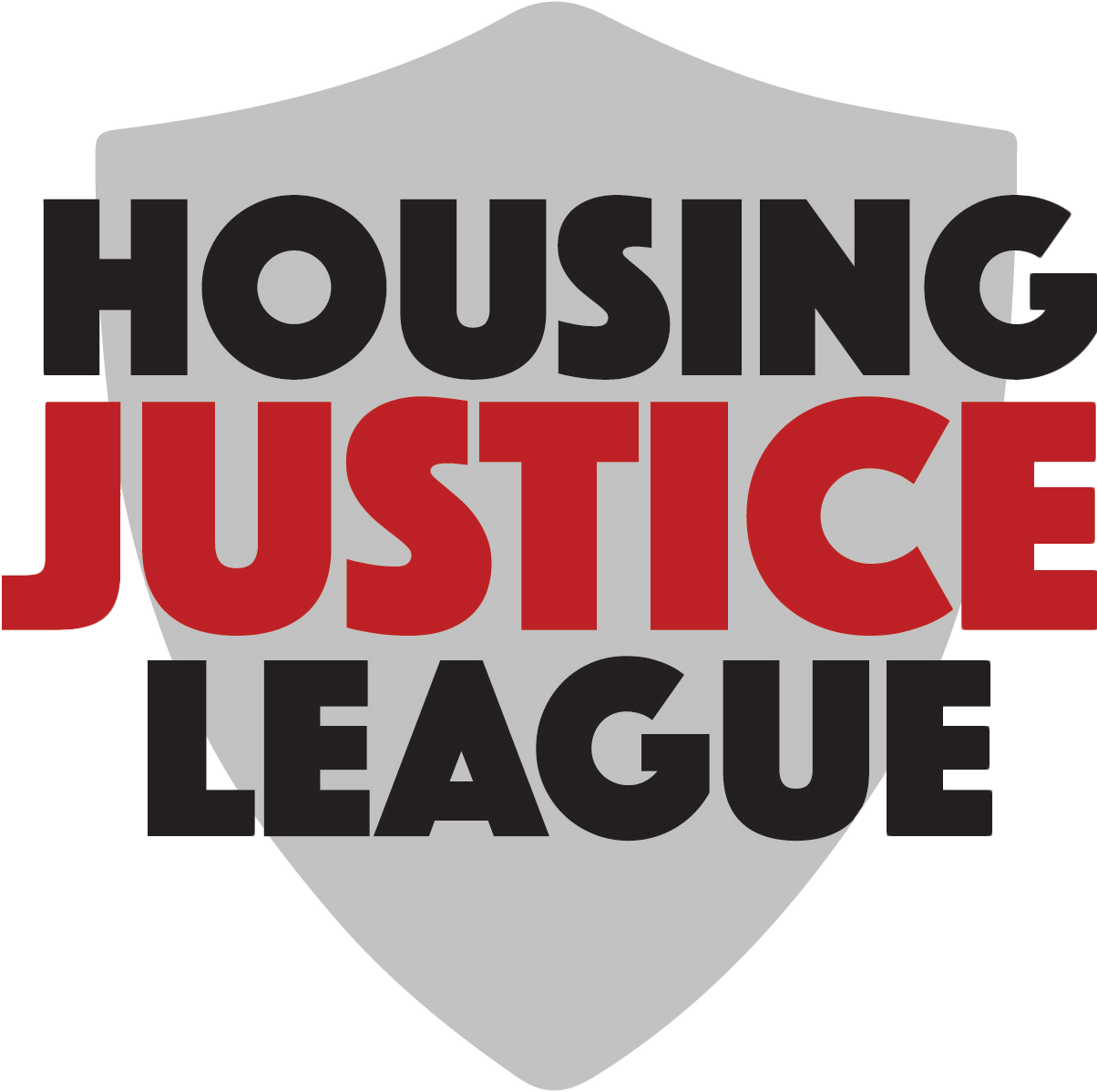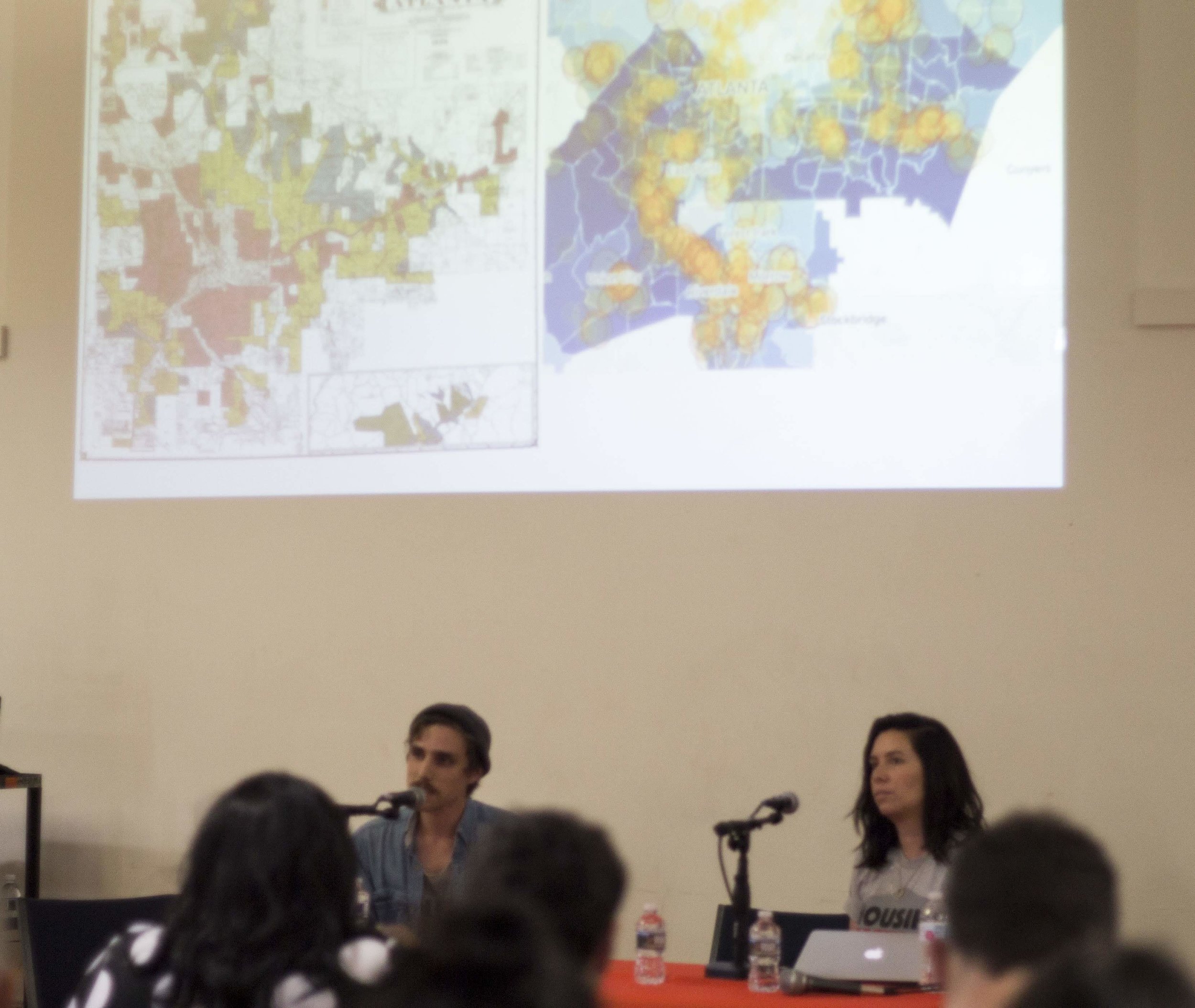Donate directly to our Eviction Defense Work and learn about how to get involved at www.housingjusticeleague.org/eviction-defense. Can we count on you to share our fundraiser on social media? This is the best way to reach people.
“Eviction defense and affordable housing remain a priority. There are many reasons for evictions and not being able to afford the rent is one of them. We need more affordable housing and we need to continue to fight to minimize evictions.” -Franklin Mack, Organizer with HJL
On the evening of May 7, Housing Justice League, in collaboration with the Redefining Affordable Housing Collective (RAHC), held a launch for HJL’s new Eviction Defense Manual at the Phillip Rush Center. The launch, titled “The County’s Eviction Crisis is Ground Zero in Struggles Against Racism, Exploitation, and Dispossession: New Eviction Defense Tools for Fulton County,” drew a crowd of approximately 100 people representing different advocacy and service provider organizations, as well as the general public. It was deeply encouraging to see a room packed with people wanting to take action on such a crucial issue displacing Atlanta’s Black and low-income communities.
The goals of the event were twofold: to offer a space for political education on the eviction crisis in the Atlanta metro area and its historical context, and to publicize and encourage community engagement with Housing Justice League’s new Eviction Defense Manual and outreach plan.
Atlanta is currently facing a brutal eviction crisis in which landlords file 800 evictions against tenants every week. The majority (53 percent) of tenants lose their opportunity to challenge their eviction in court because they do not file an answer. Many additional tenants file an answer without a proper legal defense or fail to show up to their court date. Any of these actions speed up the eviction process and tenants lose the opportunity to challenge their case. The eviction crisis is unquestionably an issue of racial justice, as the vast majority of evictions are filed against tenants in majority-Black neighborhoods. In response to this crisis, HJL has developed an Eviction Defense Manual to help renters understand their rights within the court eviction process in order to reduce the harm caused by eviction. The manual is nearly complete and will be available at housingjusticeleague.org/eviction-defense in the beginning of June.
The evening’s program was broken into four parts: a presentation of the RAHC Collective Statement, a presentation on the geography of eviction in Atlanta, a panel discussion with community advocates and organizers, and lastly, a presentation of HJL’s new Eviction Defense Manual and outreach plan. You can read the Event Program and RAHC Collective Statement in-full at housingjusticeleague.org/eviction-defense.
Johnnie Kornegay of the Counter Narrative Project and co-organizer of the event opened the evening and invited HJL Member, Richard Hunsinger, to the front to share a presentation of the RAHC Collective Statement. The Statement discusses the formation of RAHC and offers critical historical grounding for our work in resisting eviction. RAHC came together around a shared interest in the political landscape of housing in Atlanta as well as an understanding of the narrow and exclusive meaning “affordable housing” holds in mainstream political discussions. As the Statement explains,
Our name comes from an often-repeated term that permeates the discourse around [affordable housing] issues in all major cities in this country: “affordable housing.” We also deploy the term critically, in order to redefine “affordable housing” in more inclusive terms. We have learned from experience that the word “affordable” in discussions about housing policy and development often does not mean for people with low incomes, for people who rely on public housing, for people of color, for people who have been cast of out of their homes because of their sexual orientation or gender identity, for people who experience housing discrimination based on their health or physical ability, for people currently living in the neighborhoods like those of West, South, and Southwest Atlanta, and for people living on the outskirts of the city as the result of the suburbanization of poverty.
RAHC members decided to hold a political education event with the goal of bringing organizations together whose constituencies are harmed by the affordable housing crisis to challenge the conversation around “affordable housing.” Members decided to zero in on the eviction crisis in the Atlanta metro area both because it is “a site where the full range of violences related to housing injustice are acutely on display,” and to support the work of Housing Justice League.
After offering this background, the Statement turns its attention to the eviction crisis and its contextualization within the long history of racialized dispossession within the US. The Statement’s main argument is that “eviction has its roots in histories of violence and cycles of dispossession that have forced Black communities into a discriminatory and predatory rental market...,” and that “this violence is maintained by being made invisible in the same ways it has been made invisible in the past: through the justification of racialized predatory financial practices, and the obscuring of the structural nature of those practices.” It sets out to unpack and reveal the structural and historical causes of the eviction crisis in discussing dispossession as a tool used by the white propertied class to maintain its domination in systems of slavery and colonialism. Moving into our contemporary moment, the statement maps this history onto racialized local and federal housing policy and its connection to subprime mortgage lending and the eviction crisis. To read the full statement visit housingjusticeleague.org/eviction-defense.
Following Richard’s presentation we heard from Dani Aiello, a researcher with HJL and co-author of the Eviction Defense Manual. Dani gave an overview of the geography of the eviction crisis in the Atlanta metro area. She shared information about the mapping tool created by the AJC to show where evictions are taking place, and the harm eviction has for tenants such as damage to credit scores and getting pushed “down market” into substandard housing. She also provided an overview of HJL’s initial ideas on advocating for particular policy reforms at the State and local levels such as a Right to Counsel and storage for personal belongings, respectively.
The longest part of the event came next with a panel discussion. Panelists included Nasheedah Muhammad, Director of Operations with Lost-n-Found Youth; Elora Raymond, Assistant Professor, School of City and Regional Planning in the College of Design at Georgia Tech; Andrew Thompson, head of the Fulton County Housing Court Assistance Center; and Latresa Chaney, a Tenant Organizer with Housing Justice League. Some themes that emerged from the discussion were the long-lasting trauma of eviction and homelessness; Black women, mothers and children being the group most impacted by eviction; and discussion of the court process and the “Judgment on the Pleadings” court calendar in which hundreds of tenants are evicted en masse every week without the opportunity to challenge their case due to failing to include a “proper legal defense” on their Answer Form.
The final section of the night was about action and strategy. Presenters included three HJL Members and organizers, Karimah Dillard, Franklin Mack, and Natalie McLaughlin. Moving forward, with the momentum of the campaign launch behind us, we will need broad-based support from the community in order to effect change. With the eviction manual as a tool, we will work to build relationships with communities hit hardest by the eviction crisis. Our outreach strategy involves mass postcard mailings to buildings with the highest rates of eviction and a phone line where people can leave a message requesting manuals or info sessions. We plan to work with many community leaders and organizations so that knowledge of tenants’ rights in the eviction process can become widespread. If you know of an organization that may be interested in partnering with us in this work, please let us know!
By no means do we see Eviction Defense as the solution to the eviction and affordable housing crises. As long as landlords and Real Estate players maintain control over land and housing, tenants lack true community control. We see Eviction Defense as a small piece in the much broader work of building up tenant leaders for a City and State-wide movement that can exercise political power and win real renter protections in the State of GA, like rent control. If you want to plug into the work of eviction defense and tenant organizing, email us at housingjusticeleagueatl@gmail.com!
Campaign Launch News Coverage: http://atlantadailyworld.com/2019/05/07/advocates-host-forum-to-address-eviction-crisis-in-fulton-county/





